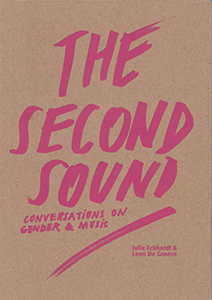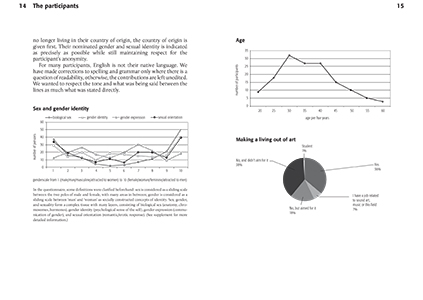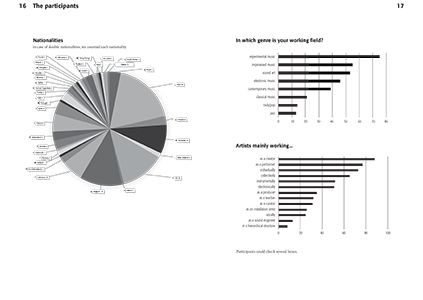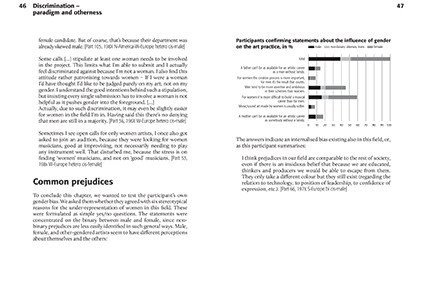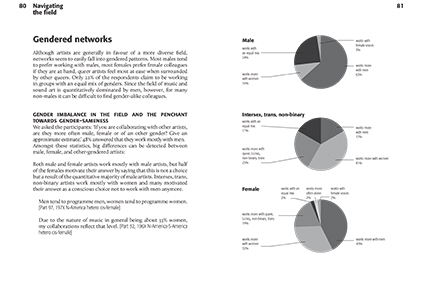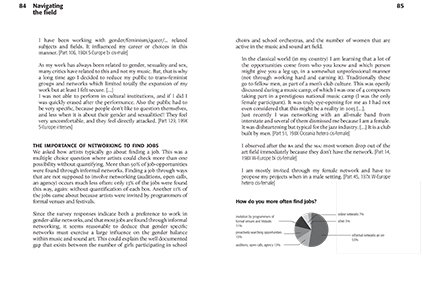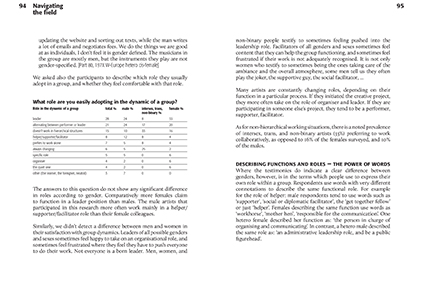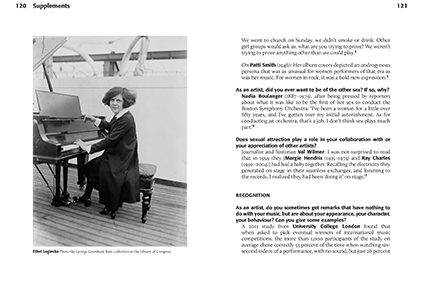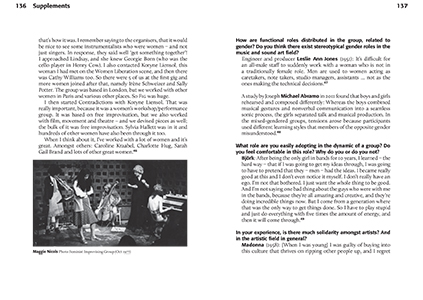Gathering anonymous testimonies from artists of different backgrounds into a single stream of (often contrary) opinions, the book addresses discrimination as a paradigm of otherness, the possibility of gendered music and sound art, and how sound artists and musicians navigate the field.
The Second Sound raises questions such as: How do life circumstances find their way into music and sound art? How does music reflect historical and social structures? What does discrimination do, and how can we navigate around it? Is the under-representation of women and LGBTQ people in the field a symptom or a cause? Is art itself gendered? And can it reflect the gender of its maker? Is a different way of listening needed to more accurately understand those voices from outside the historical canon?
Although this book raises more questions than it answers, it came to be a pledge for embracing artistic differences, for the richness of contextual listening, and for honesty in the expression of concerns and doubts. The responses seem to suggest that understanding differences by theme and not as predetermination is a way to provide freedom in a field of seemingly abstract art.
Based on the contributions of Adam Smith, Amandine Pras, Amelia Diamond,
Amnon Wolman, Amy Reed, Andrea-Jane Cornell, Angela K. Roberts, Barnabas Yianni,
Benjamin Mawson, Benjamin Silva-Pereira, Cedrik Fermont, Camila Durães, Carl Golembeski,
Cath Meeson, Christina Clar, Claire Williams, Dave Phillips, Dell, Diamanda La
Berge Dramm, Diego Garcia, Elizabeth Veldon, Frederik Croene, Furchick, Gívan Belá, Godfried-Willem Raes, Gretchen Jude, Guy De Bièvre, Hannah Reardon-Smith,
Jason Kahn,
Jorge Bachman, Julie Cambier, Hery Randriambololona, Hilary Jeffery, Ian Shanahan,
I.v. Martinez, Jerry Gordon, Jez Riley French, Jim Denley, Joanna Bailie, Jodie
Rowe, Joe Bates, Jorge Bachmann, Joseph Foster, Joseph Kudirka, José Villalobos, Julia
Teles, Julie Cambier, Julito aka Magnata, Katarina Glowicka, Keenan DuBois, Korhan
Erel, L.S.Rosenberg, Larissa Loyva, Liselotte Sels, Matthew Shlomowitz, Max Aggropop,
Michael Tuttle, Mila Dietrich, Monica Benet, Nevin Eronde, Nurse,
Okkyung Lee,
Olivia Block, Omer Eilam, Pak Yan Lau,
Pali Meursault, Patricia Janssen, Paula Daunt, Paulo
Alves, Pei-Wen Liu, Pete Shepherd, Pia Palme, Pierre Favrez, poemproducer agf Antye
Greie, Primož Sukic, Raiza Coelho, Rebecca Hunt, Roel Heremans,
Romy Rüegger, Ruta
Vitkauskaite, Sally Greenaway, Sarah Snider, Scott Mc Laughlin, Silvia Tarozzi, Steffi Weismann,
Stijn Dickel, SusannaFerrar,
Szilvia Lednitzky, Travis Johnson, Valeria Merlini,
Vera Bremerton, Vesna Tomse, Wendy Van Wynsberghe...
Julia Eckhardt is a musician and curator in the field of the sounding arts. She is founding member and artistic director of Q-O2 workspace in Brussels. As a viola player, she has been involved in various collaborations with composers and improvisers, such as
Phill Niblock,
Pauline Oliveros, Stevie Wishart, Jennifer Walshe, Wandelweiser-composers,
Christian Wolff, Antony Coleman and many of the young generation. She has taught and lectured at art institutes in Leuven and Brussels. Eckhardt is the editor of
Grounds for Possible Music – On Gender, Voice, Language, and Identity.

